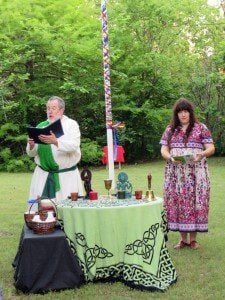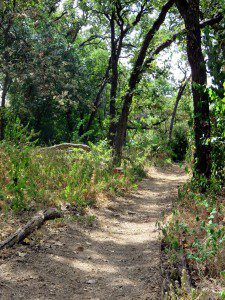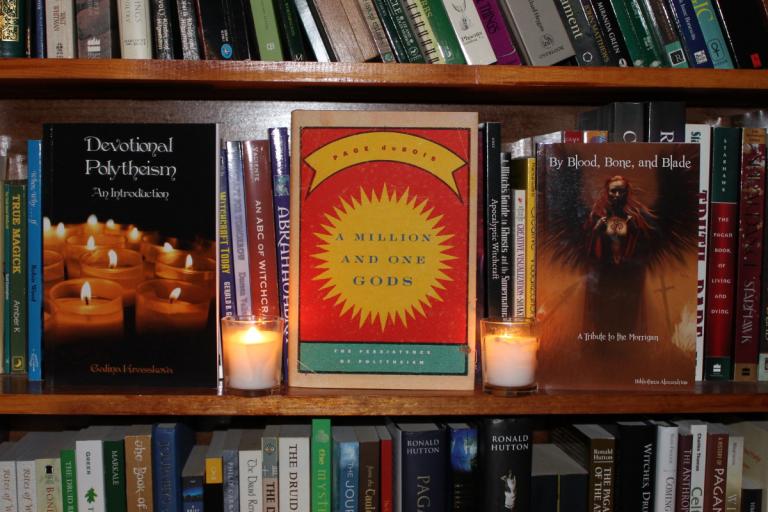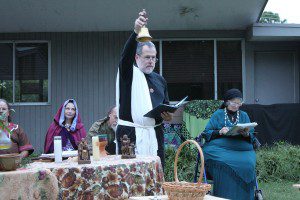 I’m a Pagan and this is a Pagan blog. I write about Paganism, polytheism, and Druidry, which are my spiritual paths. Occasionally I write about Unitarian Universalism, which is one of my spiritual homes and one of the contexts in which I practice my Paganism. I try to focus on what I do and believe and avoid talking about what I don’t do and don’t believe. When we constantly talk about what we’re not, what we used to be, and how wrong other religions are, we distract ourselves from becoming who and what we want to be.
I’m a Pagan and this is a Pagan blog. I write about Paganism, polytheism, and Druidry, which are my spiritual paths. Occasionally I write about Unitarian Universalism, which is one of my spiritual homes and one of the contexts in which I practice my Paganism. I try to focus on what I do and believe and avoid talking about what I don’t do and don’t believe. When we constantly talk about what we’re not, what we used to be, and how wrong other religions are, we distract ourselves from becoming who and what we want to be.
However, since Saturday’s post about an encounter with a fundamentalist on a sidewalk, I’ve had multiple messages saying things along the lines of “how can I get away from fundamentalism for good? How can I have the kind of good Pagan experience you described?”
I have to respond to these questions.
There is no one right way. This is what worked for me. It may work for you, or you may need to tweak the approach, or you may need to do something else. You won’t know till you get started.
You also won’t know till you keep working at it. No spell, no ritual, no sacrifice will quickly and permanently extract the tentacles of fundamentalism from your brain and from your soul. It took me many years to completely break free, though in fairness I didn’t work on it diligently for all those years. I thought if I ignored it, it would go away. It did… until something brought it right back in front of me, filling me with the same fears and insecurities all over again. I had to keep working.
Don’t expect a purely intellectual approach to succeed. Fundamentalism is intellectually flawed and exploring those flaws will build a good foundation for your escape. But ultimately, religion is a spiritual and emotional matter. It’s not enough to know the lie, you have to feel the lie… and feel the truth of something better to replace it.
I’m a Druid and a priest, not a psychologist – if you need a mental health professional, find one. Good religion is no substitute for proper mental health care. Of course, proper mental health care is no substitute for good religion.
 First, stop the bleeding. Stop attending fundamentalist churches. Stop listening to TV and radio preachers and stay off their websites. It may seem helpful to mentally argue with them, but hearing their message over and over again just reinforces the beliefs that were planted in your head long ago. Stop debating the Bible. When you argue from the Bible – even to make a religiously liberal point – you reinforce the idea that the Bible is a legitimate source of authority. It is not.
First, stop the bleeding. Stop attending fundamentalist churches. Stop listening to TV and radio preachers and stay off their websites. It may seem helpful to mentally argue with them, but hearing their message over and over again just reinforces the beliefs that were planted in your head long ago. Stop debating the Bible. When you argue from the Bible – even to make a religiously liberal point – you reinforce the idea that the Bible is a legitimate source of authority. It is not.
If you’re a teenager living with your parents, this will be difficult. Even adults may have trouble dealing with family expectations. But you will never completely heal until you stop the bleeding. If you want to get well, get out.
Accept the uncertainty of religion. Conservative Christianity places an inordinate and inappropriate emphasis on faith – on pretending beliefs are certain when they’re not. Doubt is considered a sin. Fundamentalism adds a perverse twist, claiming the Bible proves various doctrines and beliefs are true, when it does nothing of the sort.
Where did we come from? What happens after death? What is the purpose of life? Is there a purpose to life? The only certain answer to these and similar questions is “we don’t know.” There is a place for faith in Pagan and other non-fundamentalist religions, but it is in being faithful to our values, virtues, and callings, not in pretending we have certainty where we do not.
If you can’t deal with uncertainty, head over to the Atheist channel. I’m no fan of atheism, but at least they don’t torment you with threats of eternal damnation for not believing something you can’t honestly believe.
The uncertainty of religion gives lie to fundamentalist claims. If, as fundamentalists claim, the stakes for believing the “right” things are so high (eternal bliss or eternal torment), and if as they claim their God is a perfect God of love and justice, then there could be no uncertainty. “The rules” would have to be crystal clear and universally available. Otherwise their God is uncaring and unjust, because many people would never have a realistic opportunity to believe the right things. People like me – and like you.
The church I grew up in taught that Baptists and a few other low-church Protestants were going to heaven, while most Catholics and all non-Christians (including Jews, “God’s chosen people”) were going to hell. If that’s their God’s plan, it’s a pretty weak plan – such a God is unworthy of worship.
Given this situation, the most likely explanation is that fundamentalism’s claims to exclusive truth are false.
Read! Science has its limitations, but within those limits it does a better job of explaining the way things are than any other approach in existence. Read evolution – Richard Dawkins is a lousy philosopher but he’s an excellent biologist (and an entertaining writer). Read geology, cosmology, and anthropology. Learn about our ancient ancestors and contemplate how religion really began.
 When you’re ready, read the history of Christianity and learn all the things they didn’t teach you in Sunday School. Read other religions. Buddhism doesn’t appeal to me, but reading Buddhist works showed me a very different approach to religion than I had learned even in the liberal versions of monotheism.
When you’re ready, read the history of Christianity and learn all the things they didn’t teach you in Sunday School. Read other religions. Buddhism doesn’t appeal to me, but reading Buddhist works showed me a very different approach to religion than I had learned even in the liberal versions of monotheism.
Start exploring Paganism. If you’re reading about escaping fundamentalism here and not on an atheist blog or a Progressive Christian blog, there’s probably something that’s calling to you. Maybe it’s Nature. Maybe it’s the Gods and Goddesses of our ancestors. Maybe it’s magic and self-refinement. Maybe it’s Community.
Paganism is impossible to define, but it can be described. See what calls to you. Look around on this blog and on the rest of the Pagan channel. Read. Think. Contemplate. If your first try doesn’t fit, try something else. Like many people, I came into Paganism through Wicca, but Wicca didn’t work for me. But when I found Druidry I knew I was home.
Practice, practice, practice. What we believe matters, but what we do matters more. Go outside and study a tree, dig in the dirt, watch the squirrels, listen to the birds. Work to care for Nature. Find a deity who appeals to you and make offerings to Them. Learn about how They were worshiped in ancient times. Honor your ancestors. Pray. Meditate. Salute the sun and howl at the moon.
Do something every day. Do other things every week or every month. Do something special on high days and holy days. Until you figure out which tradition is right for you (and maybe afterwards) celebrate the Wheel of the Year – you’ll have lots of company.
 Expect pushback. If you’re doing all these things you should be making progress toward escaping fundamentalism. Most days this will be great. But the fears you carried for years – particularly those that were planted in childhood – don’t go away overnight. Sooner or later, they’ll come back.
Expect pushback. If you’re doing all these things you should be making progress toward escaping fundamentalism. Most days this will be great. But the fears you carried for years – particularly those that were planted in childhood – don’t go away overnight. Sooner or later, they’ll come back.
This isn’t a sign of failure. It’s just a reminder that anything worthwhile requires sustained effort. Remind yourself of what you’ve learned, remind yourself you no longer believe what the fundamentalists told you, and remind yourself why you no longer believe it.
Recommit to escaping fundamentalism and to living the kind of life you want to live and that you’re called to live.
Keep reading and practicing. You should be starting to build a nice collection of Pagan and other books by now. Look around this blog and other Pagan blogs – there are lots of recommendations for good, helpful books in many fields. And there are a few recommendations for books to avoid – not everything in the Pagan section of the bookstore is true and helpful.
Find a group. While there is no substitute for regular personal spiritual practice, there is also no substitute for the fellowship, encouragement, reinforcement, and accountability that comes from being in community with like-minded folks. And there are things you can do in a group you can’t do alone: you can’t do a spiral dance by yourself and one person can’t raise the energy that thirty can raise.
But don’t find just any group, find a group that actually does Paganism. Study groups are nice, but they’re no substitute for group ritual. Social and environmental activism is good and necessary work, but it’s no substitute for working magic and worshiping the Gods.
 Participate. Just joining a group doesn’t accomplish much. Showing up regularly will help, but if you want to develop a deep Pagan identity that will crowd out fundamentalist beliefs, you’re going to have to get your hands dirty. Join in the circle. Take a part. Take a larger part. Volunteer to help plan and present a ritual. Not everyone is interested in writing and leading ritual (and not everyone is capable of doing it well), but the more involved you are with your Paganism, the less room there will be for whatever remains of your fundamentalism.
Participate. Just joining a group doesn’t accomplish much. Showing up regularly will help, but if you want to develop a deep Pagan identity that will crowd out fundamentalist beliefs, you’re going to have to get your hands dirty. Join in the circle. Take a part. Take a larger part. Volunteer to help plan and present a ritual. Not everyone is interested in writing and leading ritual (and not everyone is capable of doing it well), but the more involved you are with your Paganism, the less room there will be for whatever remains of your fundamentalism.
Pagan identity comes in its own time.
“Enlightenment is an accident, but practice makes us accident prone” – Suzuki Roshi
Practice a religion long enough and deeply enough and eventually there comes a time when you no longer have to recite what you believe like a protective mantra – it’s part of who you are. Sometimes that comes suddenly, other times it comes gradually. Eight years of practicing infrequently and weakly didn’t do it for me. Two years of practicing regularly and seriously did.
Mine came during an initiation. The details are oath-bound, but I can say that near the end there was a formal investiture, and at that point I experienced something I had never felt before. And it felt right. The fundamentalist thoughts and fears weren’t banished so much as they were crowded out by something new and better and stronger.
I’m convinced that while the initiation was necessary, it wouldn’t have worked if I hadn’t done two years of dedicated work toward that goal.
Don’t expect the thoughts to never come again. Even after that wonderful, life-changing experience, fundamentalist thoughts (“you’ve been deceived” “you’re going to hell”) still arise from time to time. How could they not? They were part of my life for many years. But they’re not inside me any more. They’re like a ghost – not an active spirit, just the psychic remains of a past traumatic experience. They appear and then fade away, getting weaker and weaker over time.
And they don’t interfere in my life any more.
Live. One of the things that bothered me about fundamentalist Christianity even before I left was the idea that the purpose of life was to believe the right things so you could end up in the right place after you die. That always seemed like a waste of this life and this world.
I’m a Druid, but I like the Wiccan Charge of the Goddess, which includes the words “sing, feast, dance, make music and love, all in My presence.” This world can be hard and frustrating, but it can also be beautiful and joyous. Celebrate it. Enjoy it. Leave it a better place than you found it, so that when you take your place among the ancestors, those who come after you will tell your stories and sing your songs.
My hope and my prayer is that all who want to be free of fundamentalism find the courage, the strength, and the determination to escape it and replace it with something beautiful and powerful.
You may have noticed that I never defined fundamentalism. That was intentional – as soon as I define it, someone will scream that my definition is either too broad (“my religion isn’t fundamentalist!”) or too narrow (“this bunch is worse that that bunch!”). Such pedantry misses the whole point of this post, which is that religion which is exclusive, oppressive, denies established facts, and tries to enforce an out-dated moral code is a bad thing that people often have trouble escaping, even if they desperately want to.














